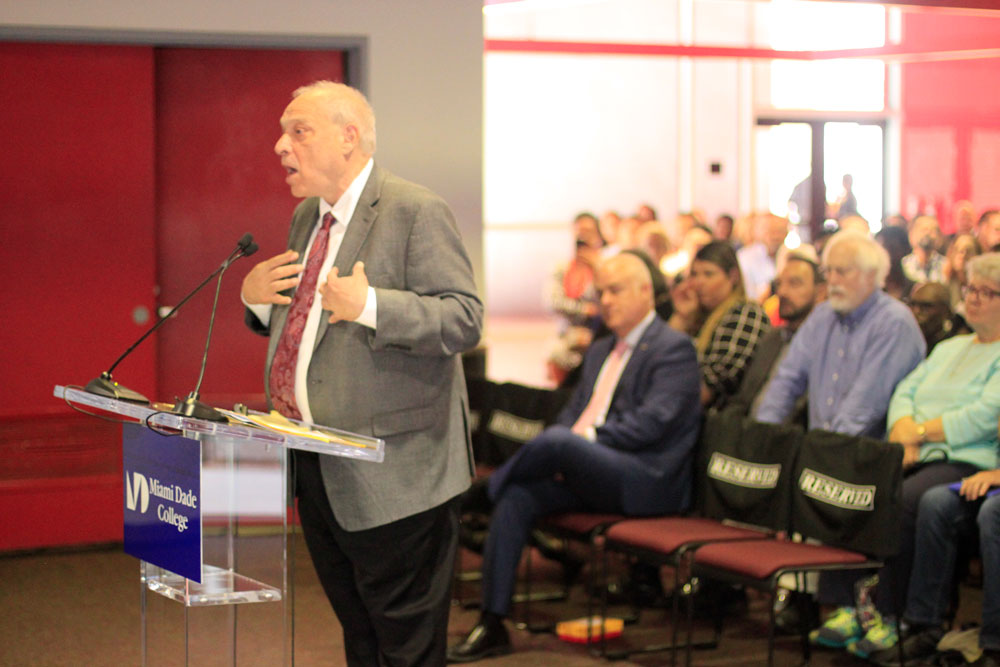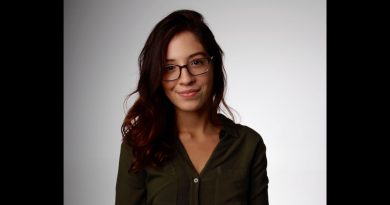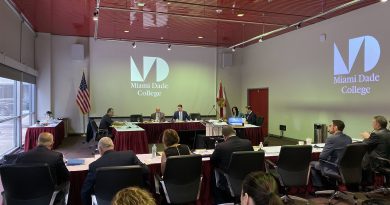Board Of Trustees Rejects Presidential Search Process Changes
After a contentious two-hour meeting, Miami Dade College’s Board of Trustees decided to affirm the current process in finding a successor for college President Eduardo J. Padrón.
The special meeting’s agenda was dedicated to the presidential search, with new board members appointed by Governor Ron DeSantis seeking to modify the minimum requirements. The proposed changes could have potentially broadened the pool of candidates to include applicants with less emphasis on academic backgrounds.
“We are pleased with today’s vote and maintain great concern and doubt about the process,” Mark Richard, former president and current counsel to the United Faculty of Miami Dade College, told The Reporter. “We’ll soon see. We want to believe it’s above board and it should be above board, and we’re only going to know it as time unfolds.”
Bernie Navarro, chairman of the Board, opened the session addressing concerns regarding political influence that plays into the Board’s role.
“We’re all political appointees of the governor,” Navarro said. But, in finding a candidate, “we all want the best.”
Richard, in a May 24 letter, urged the Board to “push back on those who might seek to capture the presidency as political spoils.”
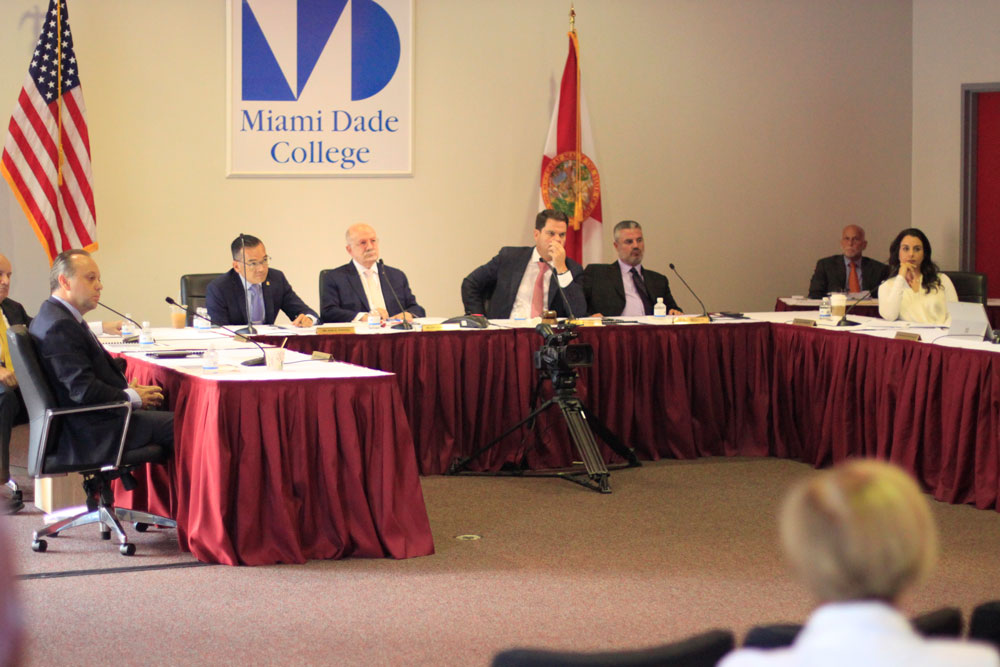
CORBIN BOLIES\THE REPORTER
He followed it up during the meeting with an impassioned speech, advising that the Board to look past the political foundation of their job to service the community and vote against changing the current qualifications.
“You may have gotten here because you’re trusted, and you are, and because you have done such in the community that others and the Governor appointed you here,” Richard said. “But the political work stops once you cross Second Avenue,” Wolfson Campus’ main street.
His remarks spurred a sharp rebuttal from recently-inducted Board member Marcell Felipe, who has advocated for lowering the minimum requirements of a doctoral degree and academic administrative experience.
“The Board’s job is to search for [the next] president,” Felipe responded, noting that the refusal to hear opposing voices contributes to the lack of discussion. “I would disagree with whoever said we were ‘lowering the bar’ or ‘lowering the standards.’ I think we’re raising them.”
When the audience groaned at his remarks, Felipe snapped back.
“You’re making my point by trying to stifle the voice of someone who disagrees with you,” he said.
Following the exchange, John Mestepey and Kim Morrison of Diversified Search, the firm hired by the College to aid the process, said there are six active candidates and a number of others waiting to apply. Board members then asked the two whether they felt the minimum qualifications were too confining in their ability to find a candidate.
“No,” said Mestepey. “It was a fairly routine standard document that we’ve seen in a number of presidential searches.”
The Board then introduced a series of motions— all of which were heavily debated, but none moved forward.
The first, proposed by trustee Anay Abraham, sought to remove the minimum requirements and instead add a list of qualifications and require that the candidates hold a terminal degree, the highest degree in their respective field. Although it was seconded by Felipe, the Board failed to get a firm understanding of what the replacement to the requirements would encompass. The revised motion died without being seconded.
The second motion, proposed by trustee Michael Bileca, looked to drop the academic administrative experience requirement, soften the language surrounding degrees (candidates having a doctoral or terminal degree are “preferred,” though a master’s degree is acceptable) and have accomplishments in the areas of academic and student service, or administrative, financial or operational—not all three as currently stipulated.
“The odds are, it’s going to be an academic, the odds are it’s going to be a doctorate,” Bileca said. “But if there is a CEO of General Electric, of Tesla, that has this dream of [wanting] to move their career to this opportunity of education and change the world, we’re restricting them.”
Before the vote was cast, board members Navarro and Fuentes came out against the motion.
“When I change a process, whether it’s in my house or in my life, it’s because there’s something telling me to change that process,” Fuentes said. “We haven’t gone through [that with] the current process.”
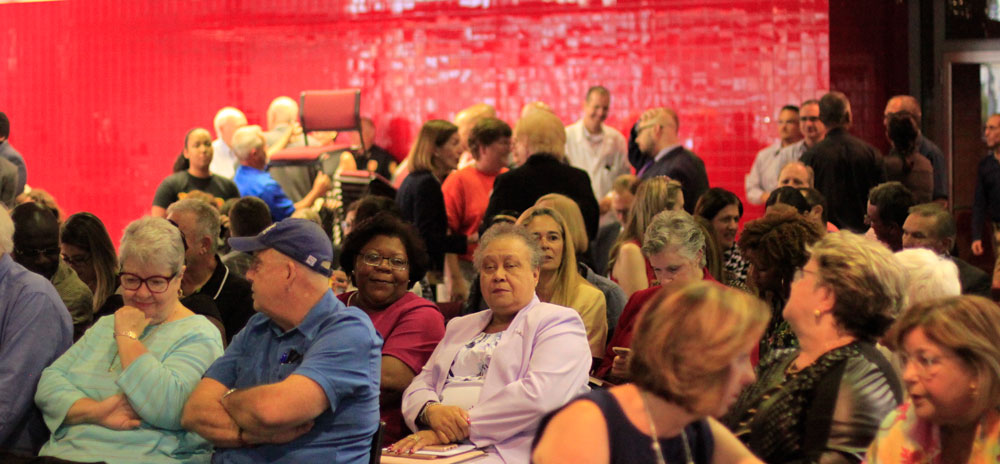
HEIDI PEREZ-MORENO/THE REPORTER
Once roll was called, the motion died 4-3. Trustees Bileca, Abraham and Felipe voted yes, with Navarro, Fuentes, Benjamin Leon and Carlos Migoya voting no.
“We are talking about the largest college in the United States—this is a very complex organization,” Migoya said, before complimenting the search firm for their process. “What’s the harm in waiting 55 days to see who the candidates are?”
The board then adjourned, to mixed results from the community.
“It’s a very first step,” Richard said in an interview with The Reporter. “We’re still very concerned. When four new trustees come on board who do not fully know the process and they decide, out of the box, to change the rules in the ninth inning, suspicions are raised.”
Even without the change, Felipe was decidedly happy for the board’s commitment to the process.
“American academia, in the last 20 years from an administrative perspective, hasn’t done a great job in managing universities. For me, it’s very important we have someone who’s going to innovate, someone’s who’s not going to come from the same pool of candidates from American academia that has bloated all other colleges,” Felipe said. “But the beautiful thing here is that this is a democratic process where we all get to provide our opinions and insights. This is an extremely qualified board and, from that, we get the best results.”
As for the man who sparked the current debate, President Padrón, he believes in the current process—even if he’s adamant about staying neutral throughout it.
“Do I have my own opinions, my own expectations? Of course. I wouldn’t be me if I didn’t,” Padrón told The Reporter. “In the end, I believe common sense prevailed and we have an opportunity to move forward in the process.

